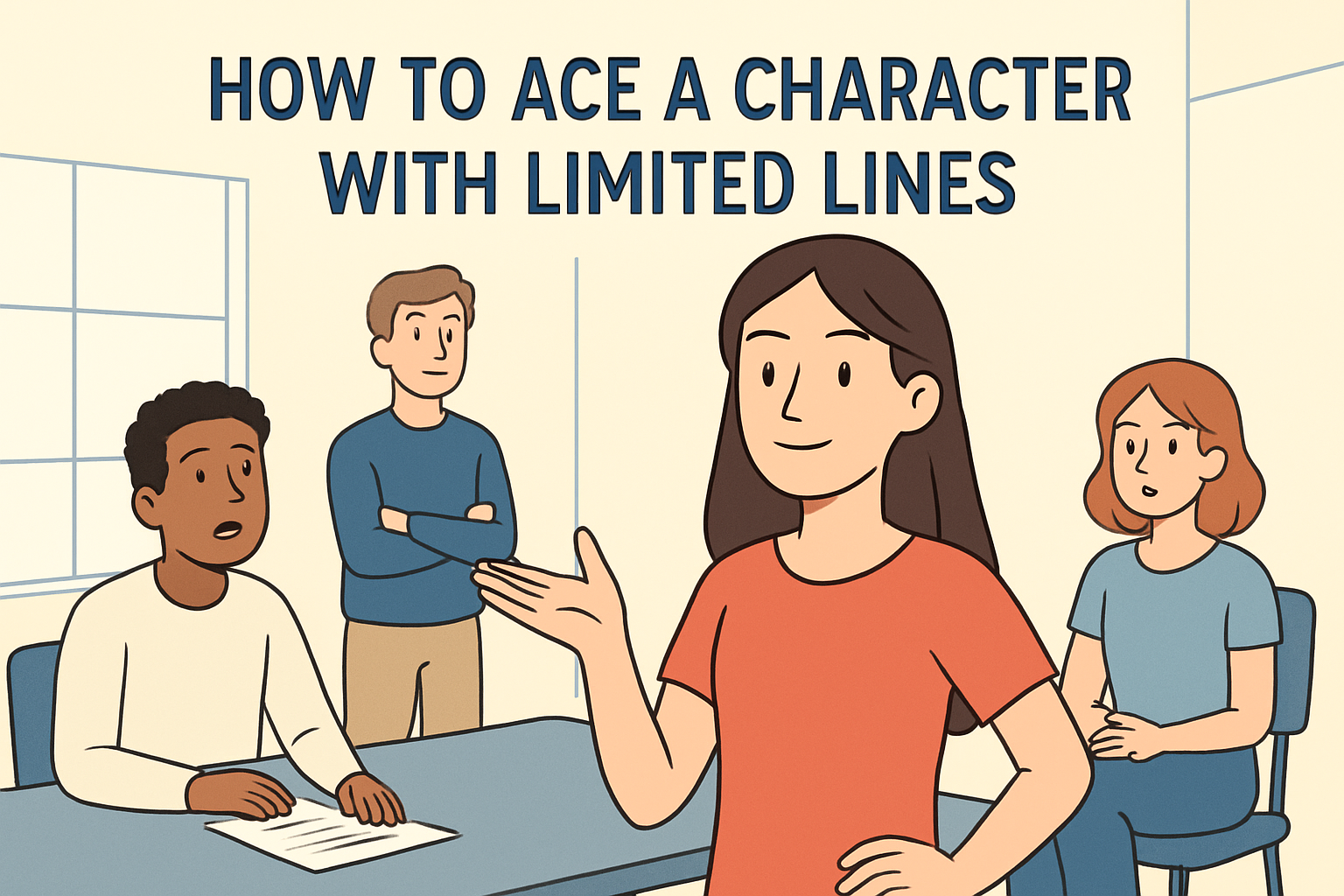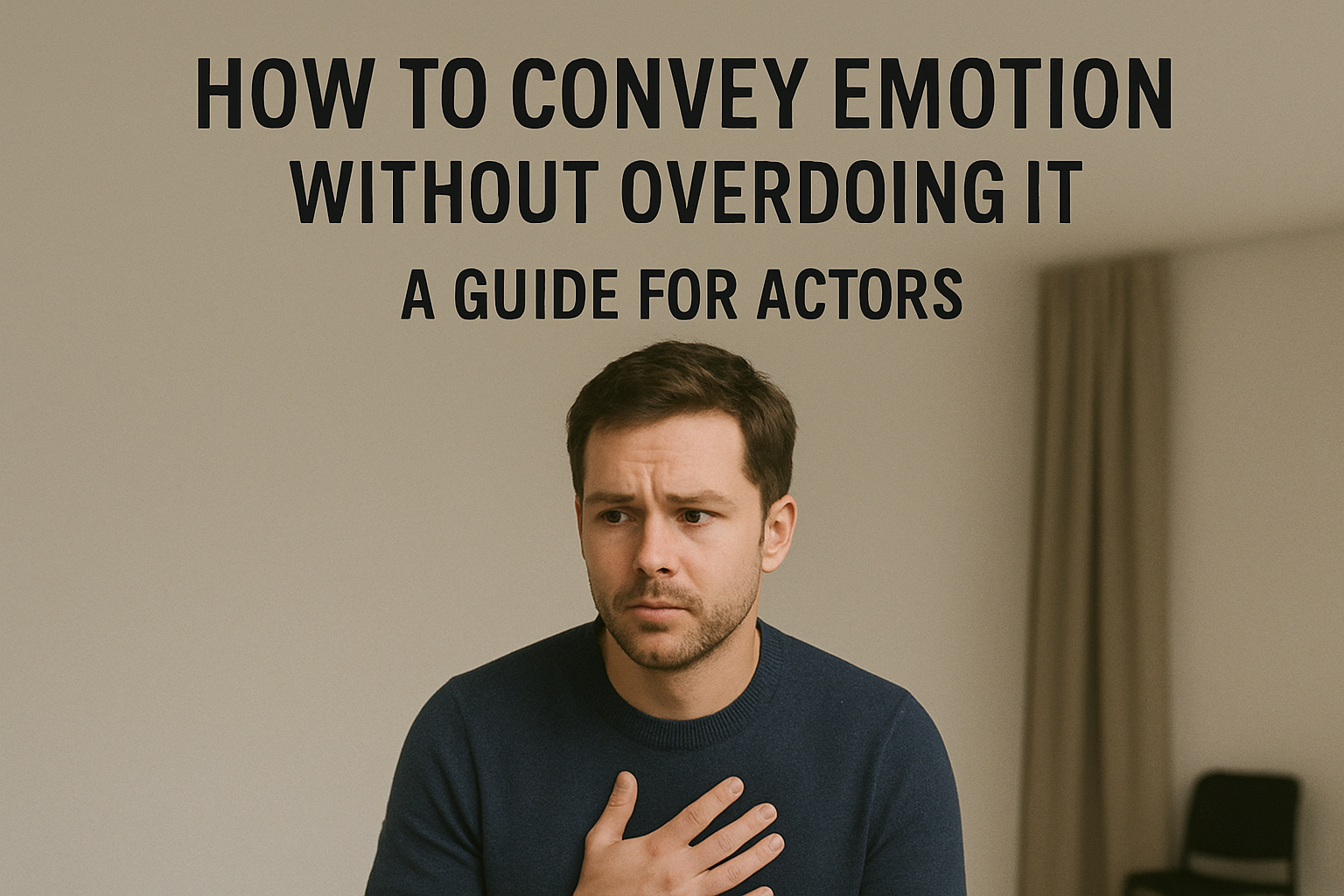
So… you received a role, or an audition, but the character only gets one or two lines — perhaps even none at all.
You may be thinking:
"How do I make a memorable impression if I don't say much?"
"Does it really matter?"
"Can I still make a strong impression?"
Absolutely, yes, and yes.
Some of the finest moments in television and film are played by characters who speak little or nothing at all — yet feel authentic and command notice. With the right approach, even a minor role can open up doors to more prominent ones.
Here's how.
1. Know Why Your Character Exists
All characters appear in a story for a reason — even the ones who don't say much.
Ask yourself:
What is their function in this scene?
What is going on around them?
How do they feel about it?
Even though the script does not reveal much, you can try to imagine who this character is and why he or she is in the moment. That will allow you to play them confidently.
2. Let Your Body Do the Talking
When you don't have a lot of lines, your body is your greatest weapon.
Your body language, facial expression, eye contact, and movement all speak a thousand words.
Example:
Are you afraid? Perhaps your arms are tense, and your eyes dart back and forth.
Are you furious? Perhaps your jaw is tight, and you don't move much at all.
Less is more. Don't act. Just be believable and natural.
3. Give Your Character a Backstory
Even if your character's name is "Waiter #3," you can still provide them with a little history.
Ask yourself:
What's their day like?
Do they give a flip about this moment?
Are they keeping secrets?
It doesn't have to be dramatic or huge. But having a history makes you feel like an actual person, and not just somebody reading a line.
4. Say More With Less
Since you only have one or two lines, it's not what you say — it's how you say it.
Let's take this line:
"She already left."
Depending on the way you deliver it, it might mean:
You're anxious
You're irritated
You're covering something up
You're attempting to be useful
That's subtext — and it turns a simple line so much more exciting.
5. Respond, Even If You're Not Saying Anything
Acting is not just about your dialogue. It's also about the way you listen and respond.
If someone else is talking in the scene, remain present. Don't sit back and wait for your line. Respond naturally — with your face, your breath, your eyes.
This is what directors and editors adore: genuine people, genuinely experiencing the moment.
6. Make Strong Choices
Regardless of whether your character is small or minor, you still need to make a strong choice:
How do you feel as your character?
What do they desire?
What are they attempting to do?
Don't play it too safe. A bold, honest decision — even in a small role — gets noticed more than playing it too boring to stand out.
7. Don't Try to "Steal the Scene"
A few actors attempt to do too much in a little part just to get attention. That most likely ends up backfiring.
Instead, be:
Real
Natural
Focused
Present
If your performance rings true, people are going to notice you — even if you say only a word.
8. Leverage Small Roles to Establish Your Career
Small roles count. Big time.
Most major actors began with one-liners or background roles. What set them apart? They approached each role — no matter the size — with attention and devotion.
Casting directors observe that.
Directors recall that.
Occasionally, writers even give you extra lines because they appreciate what you bring to the character.
Even if your character isn't talkative, you can still have a big impact.
What's most important is:
Your truthfulness
Your presence
Your decisions
Your sense of connection to the scene
Big or small, every role is an opportunity to learn, grow, and demonstrate what you can do.
Don't attempt to be boisterous. Be authentic. That's what great acting is all about.
Among the tough battles actors face is how to find the most appropriate balance between emotion display and overacting, either on stage, on camera, or when going for auditions. Many performers fear that without adequate emotions, the moment will fall flat. On the other hand, if emotions are overt, the performance may become exaggerated or not true to life.
Acting may be an art, but in the world of professional performance, it begins long before the cameras roll or the stage lights shine. It begins with the audition — the often nerve-wracking, unpredictable process that determines whether an actor even gets the chance to perform. For aspiring actors, understanding the relationship between auditioning and acting is not just important — it's essential. One feeds into the other, and together, they shape an actor’s growth, resilience, and ultimate success.
Getting into acting is hard — but succeeding as a freelance actor might be harder. Without the support of a large agency, production company, or manager, you're basically a sole proprietorship. You're the product, the marketer, the promoter, and the brand. So how do you become visible? How do you promote yourself as a freelance actor among so many talented individuals? Whether you're new to the game or wanting to level up, this guide will take you through essential strategies to create visibility, bring in opportunities, and establish yourself as a player in the cutthroat industry of freelance acting.
The entertainment sector is witnessing a huge shift, and the epicenter of this revolution is digital media. Those days are long gone when acting careers were reserved for silver-screen movies or television. Now, web series and digital media such as Netflix, Amazon Prime, Hotstar, YouTube, and MX Player have opened up the floodgates of opportunities for thespians. But what does it actually mean to be an actor in the digital age? Is it all that different from acting in the past? And why do web series prove so engaging as a platform for new and established performers?
Lights Camera Audition!
Don't miss out on the latest updates, audition calls, and exclusive tips to elevate your talent. Subscribe to our newsletter and stay inspired on your journey to success!







